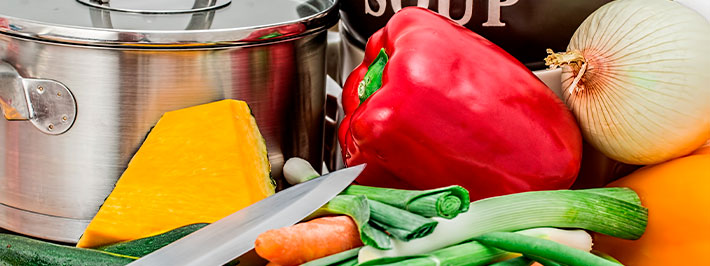
15+ disastrous culinary habits
As a general rule, a cooker knows his ranges by heart. He has dozens of delicious tips and recipes in his toolbox. But our fast pace of life and the amount of things to do and think about sometimes make us forget or ignore certain basic rules that apply in the kitchen.
For example, not everyone takes into account that bay leaves need to be removed from the broth at the end of cooking, because they add bitterness. Also not that the edges of a cake pan should not be buttered, otherwise the cake will have a lump in the middle!
1. Chill the whites before turning them into snow.
You do not need to do this. Rather, the egg whites should be at room temperature. The meringue will work even better in a double boiler.
2. Place the potatoes in the oven immediately after peeling them.
To make crispy baked potatoes, soak them in water for 30 minutes, then rinse and pat dry with a kitchen towel or paper towel. And only afterwards, we put them in the oven.
3. Butter the edges of the cake pan.
The slippery edges of the pan keep the dough from rising evenly - it rises more slowly on the slippery edges and faster in the center. A lump may form on the surface in the center of the cake.
4. Use a whole garlic clove
It is important to crush or mince the garlic before preparing the dish. This triggers a chemical reaction to form allicin, a substance with bactericidal properties. Also, a crushed pod releases essential oils.
5. Leave the contents in an open can, even if it is tightly closed.
In an open container, food will oxidize. It is recommended to transfer the contents to a glass container.
6. Cook the rice, removing the lid from time to time and stirring.
So that your long grain white rice does not turn into a sticky dough, the following rules must be observed:
The water / rice ratio should be 1.5: 1.
Choose a saucepan with a thick bottom.
Put the rice in cold water and bring to a boil, stir for the last time, reduce the heat to low and cover the pot.
Do not remove the cap, otherwise the water will evaporate and the ratio will be distorted. Rice is steamed, not hot.
After turning off the heat, let it rest for 10 minutes and then fluff with a fork.
7. Use only one or two cutting boards
There is a standardized color coding system for cutting boards that many catering organizations use:
Blue: raw shellfish.
Red: raw red meat.
Green: fruits and vegetables.
Yellow: raw birds.
Brown: cooked meat.
White: dairy and bread.
This separation prevents the transfer of bacteria and allergens from one food to another. We agree that comparing professional kitchens with domestic kitchens does not make sense. However, it is still better to use different boards to cut fish, meat, cooked foods, as well as fruits and vegetables.
8. Do not remove jewelry
Everyone knows this rule, but at home it is often ignored. Rings, bracelets, and watches can contain dirt and germs that can be spread by food.
9. Store bananas with other fruits, in daylight or in the refrigerator.
For the bananas to ripen more slowly, it is best to separate them one by one and store them at room temperature, protected from light and away from other fruits.
10. Buy powdered spices
There are unscrupulous manufacturers. For the sake of cost, they cut spices with similar plants, seeds, starch, sawdust, leaves, and other foreign components. As for industrial seasonings, they often contain flavor enhancers, artificial colors, and other chemical additives. Therefore, it is preferable to buy the spices separately, in seeds or in whole leaves, and grind them yourself.
11. Pour the foam from the broth into the sink.
As it hardens, the foam turns into a fatty deposit that clogs the sump. Instead, you can take a bowl of cold water and rinse your slotted spoon in it. Fats solidify at low temperatures, after which they are simply thrown away.
12. Wash the pans in the dishwasher.
Dishwasher detergents are harsh on cast iron pots and pans or with a nonstick coating.
13. Add flour to the sauce without heating it first.
In a hot liquid, the flour quickly turns into lumps. This will not happen if you first heat it in an ungreased pan or with a little oil.
14. Stir and flatten the butter cake very strong
Gluten proteins can make the dough thicker. If this happens, the cookies will become hard after baking.
15. Do not wash your hands after touching the eggs.
Cleaning your eggs immediately after you buy them can damage the protective layer of the shell. This can allow bacteria to enter the egg. It is also best to wash your hands after touching the shell, so as not to run the risk of being contaminated with Salmonella or running the risk of getting sick.
16. Leave the bay leaf in the prepared dish.
The bay leaf, which remains in the pot for a long time, adds bitterness to broths and main dishes. It is best to add it at the end of cooking and leave it for 10 minutes, no more, after turning off the heat.
17. Using overripe fruit for jam
Overripe berries and fruits contain little pectin and jam has difficulty gelling.